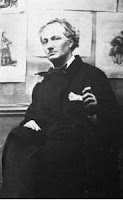One good reason that these posts do not get written is that I start poking around in the texts themselves, and since I now want to race through post-Romantic French poetry, I find myself a bit crushed. Charles Baudelaire, Paul Verlaine, Arthur Rimbaud, Stéphane Mallarmé – it is all so wonderful. And those are just the giants of the period.
In his “Épigraphe pour un livre condamné” (“Epigraph for a condemned book”), Baudelaire urges his “quiet” and “sober” readers to throw away his book Les Fleurs du mal, leaving it to those who know how to plunge their eyes into the gulfs. “Lis-moi, pour apprendre à m'aimer” – “Read me, to learn to love me.”
Well, we sure did, even many of us who have never read him. Baudelaire and Les Fleurs du mal (1857) are the beginning, or the beginning of the end if you think it was a wrong turn. It is because of Baudelaire that Modernism is Modern.
There are many aspects to Baudelaire, even within Les Fleurs du mal; I guess my preferred Baudelaire is the one who brought Romantic ideas about nature to the city. Romantic in theory, since the young French Romantics have a pretty darn tenuous relationship with actual living nature. They are awful citified. Baudelaire is really looking around and writing about what he sees. If he lived in Jura and wrote about bird’s nests and yeast, he would have been a Romantic, but he lived in Paris and wrote about apartment buildings, which is Modern.
Paris change! mais rien dans ma mélancolie
N'a bougé! palais neufs, échafaudages, blocs,
Vieux faubourgs, tout pour moi devient allégorie
Et mes chers souvenirs sont plus lourds que des rocs. (from “Le Cygne”)
Paris changes! but nothing in my melancholy
has moved! new palaces, scaffolding, blocks,
Old neighborhoods, for me it all becomes allegory
And my memories are heavier than the rocks. (from “The Swan”)
I read Les Fleurs du mal in French about a year ago, so I can sympathize with the French students clawing through it for the Bac. It is pretty hard in places. Mallarmé is probably still too hard for me, I mean if I am trying to understand him. Tristan Corbière is too hard, the language too crazy. Jules Laforgue looks about right. Arthur Rimbaud is clearly within my level.
The easy one is Paul Verlaine. Much of his best work, entire (miniature) books, are readable by someone with a semester of French, a real beginner. The beauty of his sound is audible. He generally does not use too many words. They are often such an obstacle to the language-learner, the words. Verlaine felt like a reward. When I could not read very much, I could read him. I have read his first four books in French – “books,” they are such little things – and will keep going someday.
Anyway. It’s all a marvel. A rupture. The beginning of “make it new,” the beginning of poetic tradition that has stretched with real continuity until – I am not sure. Possibly not today. Poetry has a large place in French culture; contemporary poetry, maybe not much at all. Who knows what will happen. Meanwhile, French high school students will spend this spring cramming Hugo, Baudelaire, and Apollinaire. Good luck.



